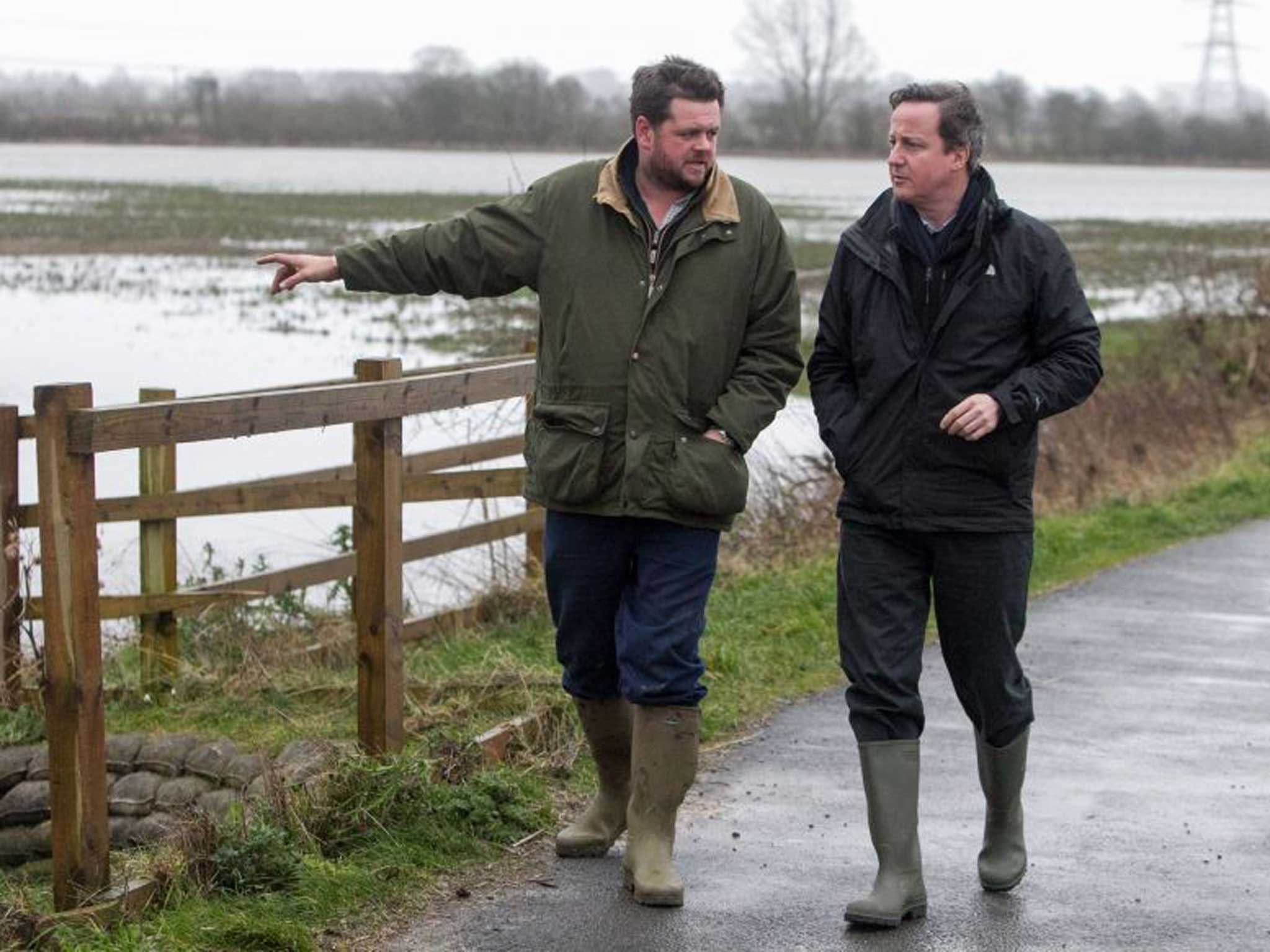Climate change and its risks are not going away, Mr Cameron
A scientist who co-wrote a report seven years ago predicting current levels of flooding says that ministers are still disinclined to do what is needed. The PM must show leadership as much as sympathy

The current flooding crisis is one of a succession to hit England. After the widespread flooding in 2000, the Department of Trade and Industry commissioned the Foresight “Future Flooding” study which involved some 90 national experts. The reports covered how flood risks would change up to the 2080s and what we might do to cope with a changing climate. We revisited these in 2007 for Sir Michael Pitt’s inquiry into the devastating flooding that year. This concluded that climate change would lead every 10 per cent increase in rainfall intensity to cause at least 40 per cent more flood damage.
We also concluded that protection of the sort that had prevailed until then was too expensive, and that communities and individual households would need to take more responsibility for protecting themselves. Further, that a more flexible, adaptable and “learning by doing” approach should be taken. Things began to happen and many of Pitt’s more than 90 recommendations were gradually being implemented.
Yet a huge amount remains undone. To understand why, despite our reports predicting precisely what is coming to pass, you need only look at what drives our politicians and policymakers. The situation in England is a systemic failure to take a longer-term and strategic approach to environmental hazards.
First, many in government either don’t believe, or don’t wish to upset those who don’t believe, that the climate is changing. The Department for Environment, Food and Rural Affairs (Defra) is led by ministers who are farmers and don’t accept that the climate is changing. The Department for Communities and Local Government is led by a minister who is committed to sweeping away all regulations to do with development and building control. The National Planning Policy framework is a pale shadow of the previous planning guidance and, behind closed doors, ministers are once again promoting building on flood plains, despite the misery this brings to those who are eventually inundated. If we were to emulate the Dutch and build appropriately, this would not matter as we would be protecting people’s safety when the floods came. Climate change and the risks this brings are not going away, whatever Nigel Lawson believes.

Second, both political and public memory about flooding is short. Only those who are regularly flooded tend to retain an awareness. In 2004, we held the view that only when London flooded would proper notice be taken; and, as the current floods creep closer to the capital, David Cameron’s interest and high-profile activity grows. As interest in floods falls away rapidly after a major event, short-term political agendas return and only what affects the outcome of the next election becomes important. We are not fooled into thinking that the present government will do much once memory has faded, though we can probably expect yet another inquiry, to delay necessary but unpalatable action.
Third, inconvenient scientific evidence that does not support ambient government policy is either ignored or rubbished in the UK. Our Foresight reports and six years of research by the Flood Risk Management Research Consortium, and from Dame Julia Slingo of the Met Office, have been ignored in favour of the status quo.

Lobbying maintains “business as usual” in England – both Wales and Scotland deal with water and flooding better – allowing developers to continue as always with scant regard for the overall societal risks. Earlier this year, Defra announced it was delaying the commencement of Schedule 3 of the Flood and Water Management Act, which sets out how sustainable drainage systems were to be used and maintained in all new developments. This was a major change in the managing of surface water in England, with water being held up near to where it lands and used to create attractive green spaces, in so doing helping to prevent downstream flooding. Fierce lobbying has put this on the back burner, with house builders claiming they are already doing this, but ponds on housing estates and below-ground storage of water is not what Sir Michael envisaged. Besides, builders have a “get out of jail” clause which allows them not to use sustainable drainage if this can be shown to be more costly (to them, not the rest of us). A major opportunity has been missed here to provide better flood protection and create better neighbourhoods and promote wildlife. The “greenest government ever” is demonstrating its credentials once again.

These delays are also hampering the “pared-down” local authorities, which, under the 2010 Act, have new duties as lead local flood authorities. Many had already gone ahead and started to implement their new duties, despite the lagging legislation. Others have done nothing. Given uncertain future funding, it is understandable that these authorities might be reluctant to take on new duties.
Treasury funding rules and government priorities must change. For a start, £32bn diverted from HS2 would provide a lot of flood defences. In the lower Thames, the Environment Agency’s strategy follows what has been recommended in all the expert studies and demonstrates good value for money with a benefit-to-cost ratio of 6.4:1, yet it struggles to raise the funds for implementation. Many of the areas currently inundated would have been protected if this work had gone ahead sooner.

In 2006, I warned the House of Lords Science and Technology Committee that England was poorly prepared for droughts and that an integrated approach to managing both floods and droughts (the norm in countries such as Australia and the US) was needed. Managing the water cycle requires vision, strategy and, above all, leadership. We have one of the most complex institutional systems in the world for water management. The obsession with pseudo-competition, as promoted in the Water Bill, promises to further fragment these already dispersed responsibilities. Things can only get worse for England.
Richard Ashley is professor of urban water at the University of Sheffield
Join our commenting forum
Join thought-provoking conversations, follow other Independent readers and see their replies
Comments